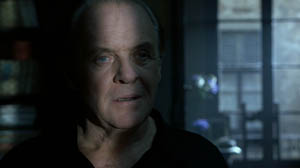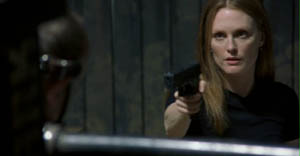|
Call me crazy, but I like this one. In fact, you can call me anything you like, because I can't hear a thing you say.  Hannibal is one of those strange curiosities, much like The Phantom Menace, in that it was a film that everyone seemed to bitch and complain about, but which proceeded to make a kershmillion bucks nonetheless. Who the hell was spending all that money if the film was so generally dissed? Of course, much of the initial enthusiasm stemmed from the eager fans of 1991's Oscar award-winning The Silence of the Lambs, who couldn't wait to see their favorite psychopath chewing up the scenery once again. (Did you get that? It was pun about eating in reference to a cannibal! I've just reinvented the art of film review!) But after novelist Thomas Harris finally delivered the long-awaited sequel, more than a few red flags went up, and when Davis Mamet's initial screenplay actually kept the ending close to that of the book, Jodie Foster and Lambs director Jonathan Demme both backed out of what promised to be a rather ghoulish experience. When a rewrite that was designed to move sympathy back to the character of Clarice failed to sway Foster's decision, the studio gave up on her and cast Julianne Moore in the role, but also junked Mamet's second draft anyway, bringing in Steven Zaillian of Schindler's List fame to start the screenplay from scratch. Ridley Scott signed on as director, and everyone waited to see what would happen with the tumultuous project. The first thing that happened was the largest opening weekend to date, and the second thing that happened was a general agreement that the film wasn't up to the standards of its predecessor. In all truthfulness, it actually isn't as good a film as Silence of the Lambs, but in another sense it's almost an unfair comparison. The stigma of having such a critically lauded film to live up to hardly gave Hannibal the chance to be its own film, which is exactly what it was aiming to do. It wasn't even really in the same genre as Lambs; if that film had been slightly less of a police procedural drama than the 1986 film Manhunter (the first film to feature the Lecter character,) then Hannibal was even further afield, going from the environs of cop drama right into the world of gothic horror, and fans weren't swallowing it (and by "it," I of course mean pan-fried pieces of their own brains. Because it's topical, see!) The film almost certainly would've fared better without all that baggage it came with; the more warmly-received Manhunter remake Red Dragon proved that a retread of the concept of Lambs (even if it were based on a prior story) was really what people wanted to see. It's certainly true that the character of Clarice Starling has a lot less to do in this film than in the previous one, though, to be fair, the film is titled "Hannibal" and not "Clarice." In many ways, it's almost a reversal of Silence of the Lambs: now it's Lecter that is free and pursuing his interests while Clarice is virtually imprisoned in a basement dungeon. She wants out, and Hannibal could be that way out for her, if she can once again prove her worth after the undeserved fall from grace she suffers after being made scapegoat for a botched drug raid. But other parties have an interest in Lecter and conspire to use her floundering circumstances to draw him out. It's really the parley between the two of them that drives the emotion in both this film and Lambs, and we get a lot less of it this time around, though Zaillian managed to make this far less the case than it was in the novel, where the two don't come face-to-face or even voice-to-voice until the final act. Her story, albeit sparse, is effectively woven into the middle act, which follows an at least semi-sympathetic Italian detective on a similar career downturn as he discovers both Lecter's identity and the sizeable reward offered by the doc's only surviving victim. While Starling's involvement in these events is minimal, in the book it was nonexistent, which would've been something of a disaster onscreen. Still, the main problem is that she, our protagonist, is never really in any danger. In fact, most of the people who are at serious risk of coming to bad ends are as bad or worse than Lecter himself, which leaves us wondering what our stake in this as an audience really is.  Of course, the primary narrative difficulty was with the ending, which was the bit that Jodie Foster had balked at, labeling it as an outright betrayal of the character she had played to such acclaim previously. That ending, which had featured Clarice turning her back on the system that had mistreated her to become Lecter's gal Friday, got seriously removed from the screenplay, to both good and bad effect. Good, because it frankly was scarcely believable, let alone sympathetic, but bad because it leaves her with no character arc to speak of. The novel took her on a journey of development, however much one may have cared for it. The Clarice of the film takes a straight-line road through the narrative, which makes her much more realistic and likeable but leaves us wondering what her point in the story was. Lecter likewise doesn't change, nor do we learn anything about him that's new. The book had included a lot of background info, but much of it was somewhat simplistic from a psychological point of view, and none of that got into the film, either. Hannibal seems less a flesh-and-blood individual and more of a malevolent force of nature, a kind of infectious evil that corrupts everything it comes into contact with. Ridley Scott plays up the religious imagery and metaphors, casting Hannibal somewhere between Lucifer and Jesus; a romanticized, charming evil who is betrayed into his enemy's hands for money (the first thing we hear in the film is the sound of clinking coins) and strapped more or less to a cross to await execution, the perversion of this being that Lecter really does deserve all that his enemies wish upon him, and yet he still comes across as being very nearly the hero of the piece. The most disturbing thing about this fact is just how disturbing it isn't. The most enjoyable parts of the film involve watching Hannibal bait, stalk and terminate his quarry--I say this as one whose favorite scene in Silence of the Lambs was, for whatever reason, the bit of Lecter escaping incarceration wearing the peeled-off face of a prison guard--and yet I don't think my co-workers need fear the day I show up with an AK and start thinning the herd. Evil has always had a seductive air about it, and even the sane amongst us seem to need our fill, just like I can't seem to get my fill of my neighbor's pancreas. Mmmm-mmm! Don't tell the cops, okay? If there's a single generalized weakness to Hannibal, it's in being something of a sort of anti-gestalt, a whole that is somewhat less than the sum of its parts. Taken apart like a human torso ready to be served up with some yummy white wine sauce, the component elements are terrific: some great scenes, a lot of impressive performances-obviously including Anthony Hopkins' reprised role-fabulous direction from Scott, who managed to refrain from fluttering things or dripping water and still get his trademark look all over the film; gorgeous cinematography courtesy of John Mathieson, a totally beautiful score by Hans Zimmer that gets seriously worked into your head like a pair of chopsticks...all the elements that make a great film, but somehow only coming together to make a decent one. It boils down to the fact that the source material was less compelling than last time, and all the tweaking and prodding in the world wasn't going to alter that fact to any great degree. I try not to look for anything overly significant here and end up having a pretty good time with all the beautiful pieces. As eye candy-or brain candy; wow, I did it again! I'm a journalistic GOD!-goes, Hannibal is tastier than your left leg on a loaf of rye. A huge, melodramatic opera about a freak who likes to eat people is actually kind of unusual, and if you like monster flicks, you could do a lot worse. If you're an "evil" goth kid, you'll probably like it, too, even though I'll probably think you're a pretentious weeny. Okay, there is a little dripping water. But only a little. -review by Matt Murray
|
|
||||||||